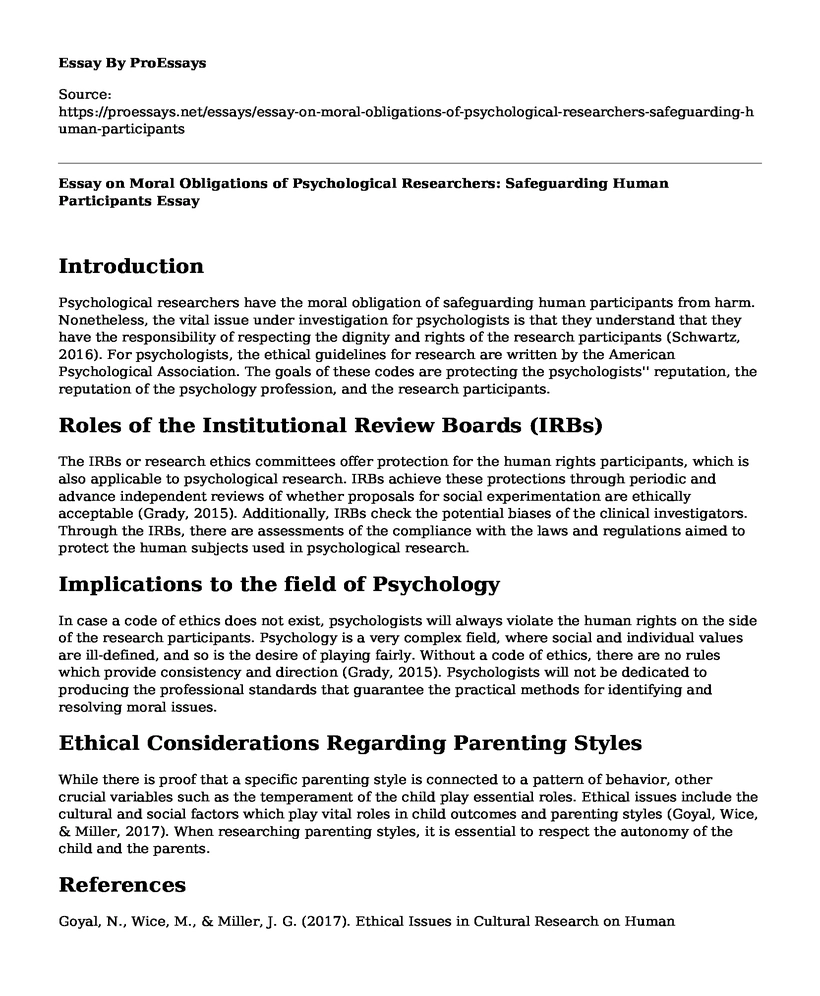Introduction
Psychological researchers have the moral obligation of safeguarding human participants from harm. Nonetheless, the vital issue under investigation for psychologists is that they understand that they have the responsibility of respecting the dignity and rights of the research participants (Schwartz, 2016). For psychologists, the ethical guidelines for research are written by the American Psychological Association. The goals of these codes are protecting the psychologists'' reputation, the reputation of the psychology profession, and the research participants.
Roles of the Institutional Review Boards (IRBs)
The IRBs or research ethics committees offer protection for the human rights participants, which is also applicable to psychological research. IRBs achieve these protections through periodic and advance independent reviews of whether proposals for social experimentation are ethically acceptable (Grady, 2015). Additionally, IRBs check the potential biases of the clinical investigators. Through the IRBs, there are assessments of the compliance with the laws and regulations aimed to protect the human subjects used in psychological research.
Implications to the field of Psychology
In case a code of ethics does not exist, psychologists will always violate the human rights on the side of the research participants. Psychology is a very complex field, where social and individual values are ill-defined, and so is the desire of playing fairly. Without a code of ethics, there are no rules which provide consistency and direction (Grady, 2015). Psychologists will not be dedicated to producing the professional standards that guarantee the practical methods for identifying and resolving moral issues.
Ethical Considerations Regarding Parenting Styles
While there is proof that a specific parenting style is connected to a pattern of behavior, other crucial variables such as the temperament of the child play essential roles. Ethical issues include the cultural and social factors which play vital roles in child outcomes and parenting styles (Goyal, Wice, & Miller, 2017). When researching parenting styles, it is essential to respect the autonomy of the child and the parents.
References
Goyal, N., Wice, M., & Miller, J. G. (2017). Ethical Issues in Cultural Research on Human Development. Handbook of Research Methods in Health Social Sciences, 1-14. Retrieved from https://www.researchgate.net/profile/Namrata_Goyal2/publication/320865857_Ethical_Issues_in_Cultural_Research_on_Human_Development/links/59ff6f49458515d0706d8658/Ethical-Issues-in-Cultural-Research-on-Human-Development.pdf
Grady, C. (2015). Institutional review boards: Purpose and challenges. Chest, 148(5), 1148-1155. Retrieved from https://www.ncbi.nlm.nih.gov/pmc/articles/PMC4631034/
Schwartz, M. S. (2016). Ethical decision-making theory: An integrated approach. Journal of Business Ethics, 139(4), 755-776. Retrieved from https://files.transtutors.com/cdn/uploadassignments/2721686_1_ethical-decision-making-theory.pdf
Cite this page
Essay on Moral Obligations of Psychological Researchers: Safeguarding Human Participants. (2023, Jan 29). Retrieved from https://proessays.net/essays/essay-on-moral-obligations-of-psychological-researchers-safeguarding-human-participants
If you are the original author of this essay and no longer wish to have it published on the ProEssays website, please click below to request its removal:
- Philosophy Essay Example: Analysis from a Utilitarian Perspective
- Trainer Manual: Stress Management
- Ethical Leadership in Business Essay Example
- Moral Integrity in International Organisations Paper Example
- Essay Sample on Police Officers' Mental Health: Accessing Support in Emergencies
- Essay Sample on Mental Illness & Criminal Justice: Over 1.2M Affected Annually
- The Benefits of Social Identity Theory for Teachers - Essay Sample







